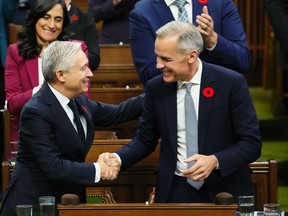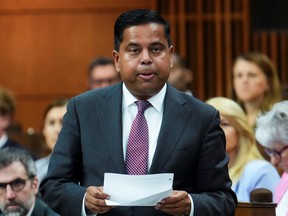World
Canadians Disappointed in Carney’s Government Despite Approval Rise

Most Canadians express disappointment with Prime Minister Mark Carney‘s government, citing a failure to fulfill campaign promises, according to a new poll by Postmedia and Leger. Despite this sentiment, Carney’s overall approval ratings have seen a modest increase, indicating a complex relationship between public expectations and government performance.
Public Sentiment Towards Carney’s Government
In an online survey conducted among nearly 1,600 Canadian adults from October 31 to November 2, 2025, 72 percent of respondents indicated they were “disappointed with the progress” made by Carney’s administration in addressing the ongoing cost-of-living crisis. Furthermore, 64 percent voiced frustration regarding his commitment to manage government spending amid a growing deficit.
This polling data emerges shortly after Carney presented his much-anticipated budget, which was described as a “generational investment” aimed at addressing pressing economic issues. However, opposition parties wasted no time in criticizing the plan. Pierre Poilievre, Leader of the Conservative Party, condemned the budget in a recent speech, stating, “On behalf of all the Canadians who can no longer afford to eat, heat or house themselves because of Liberal inflation, we, Conservatives, cannot support this costly Liberal budget.”
Despite the criticism, Andrew Enns, executive vice-president at Leger, noted that the poll results could present a challenge for the Conservatives. He explained, “For Conservatives, their biggest issues are affordability, and that’s where the current government is performing the poorest according to the Canadian population. Yet it’s not translating into increased support for the Conservatives.”
Approval Ratings Show a Complex Picture
Current polling indicates that if an election were to be held today, the Liberal Party would maintain a lead with 43 percent of the vote, while the Conservatives would trail at 38 percent. Notably, 46 percent of Canadians report satisfaction with the Liberal government, marking a four-percentage point increase since last month. Carney’s approval rating has also risen to 52 percent, reflecting a five-point increase from the previous month.
Enns remarked, “People still want Carney to succeed. They elected his government, and they’re still giving him the benefit of the doubt.” However, this goodwill appears to be waning in traditionally conservative provinces such as Alberta and Saskatchewan, where sentiments have begun to shift. Enns noted that support for Carney in these areas, initially bolstered by his vision of making Canada an energy superpower and reducing the carbon tax, is starting to erode.
Canadians from Manitoba, Saskatchewan, and Alberta rated Carney’s performance the lowest. Overall, dissatisfaction with his handling of key issues remains significant, with 64 percent of respondents expressing disappointment over the government’s management of the trade relationship with the United States. Additionally, 71 percent indicated they were dissatisfied with efforts to make housing more affordable, a sentiment particularly strong in British Columbia, which faces a notoriously high cost of living.
Moreover, 52 percent of participants expressed disappointment regarding Carney’s progress in revitalizing Canada’s military forces, the highest level of dissatisfaction recorded in the poll. Given that only 10 percent of respondents felt positively about how Carney’s government has delivered on campaign promises, Enns emphasized the challenges ahead for the Liberals. “The government may think they’ve made a lot of progress around the cabinet table, but it’s not translating into the public,” he stated.
As the political landscape evolves, the upcoming budget discussions will be crucial for the Liberals. Enns concluded, “The Liberals can’t look at this and say ‘we’re on the right path,’ so they’ve definitely got some heavy lifting to do.”
While online polls do not carry a margin of error, this particular survey provided an estimated margin of plus or minus 2.5 percentage points, with a confidence level of 95 percent. As Canada navigates these complex economic and political challenges, the public’s expectations of its leaders remain high.
-

 World4 months ago
World4 months agoScientists Unearth Ancient Antarctic Ice to Unlock Climate Secrets
-

 Entertainment4 months ago
Entertainment4 months agoTrump and McCormick to Announce $70 Billion Energy Investments
-

 Lifestyle4 months ago
Lifestyle4 months agoTransLink Launches Food Truck Program to Boost Revenue in Vancouver
-

 Science4 months ago
Science4 months agoFour Astronauts Return to Earth After International Space Station Mission
-

 Politics22 hours ago
Politics22 hours agoSecwepemc First Nation Seeks Aboriginal Title Over Kamloops Area
-

 Technology2 months ago
Technology2 months agoApple Notes Enhances Functionality with Markdown Support in macOS 26
-

 Top Stories4 weeks ago
Top Stories4 weeks agoUrgent Update: Fatal Crash on Highway 99 Claims Life of Pitt Meadows Man
-

 Sports4 months ago
Sports4 months agoSearch Underway for Missing Hunter Amid Hokkaido Bear Emergency
-

 Politics3 months ago
Politics3 months agoUkrainian Tennis Star Elina Svitolina Faces Death Threats Online
-

 Politics4 months ago
Politics4 months agoCarney Engages First Nations Leaders at Development Law Summit
-

 Technology4 months ago
Technology4 months agoFrosthaven Launches Early Access on July 31, 2025
-

 Top Stories2 weeks ago
Top Stories2 weeks agoFamily Remembers Beverley Rowbotham 25 Years After Murder



















